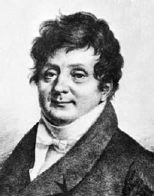

Joseph Fourier showed talent for literature in school, but by the age of 13, mathematics
became his real interest. When he was 19, he decided to train for the priesthood and entered a Benedictine abbey. His interest in mathematics continued, however, and he was unsure if he was making the right decision.
Fourier ended up not taking his religious vows. He visited Paris and read a paper on algebraic equations, and submitted a paper on algebra. In 1790 he became a teacher at the Benedictine college, where he had studied. In 1793, he became involved in politics and joined the local Revolutionary Committee. For this, in 1794, he was arrested, imprisoned, and released.
Later in 1794, Fourier was nominated to study at the Ecole Normale in Paris. This institution had been set up for training teachers and it was intended to serve
as a model for other teacher-training schools. The school opened in 1795 and Fourier was certainly the most able of the pupils whose abilities
ranged widely. He was taught by Lagrange, Laplace, and Monge.
Fourier began teaching at the Collège de France and began further mathematical research. He was also appointed to a position at what was soon to be renamed the Ecole Polytechnique. However, repercussions of his earlier arrest remained and he was again arrested, imprisoned, and released. In 1797, he succeeded Lagrange in being appointed to the chair of analysis and
mechanics. He was renowned as an outstanding lecturer but he does not appear to have undertaken original research during this time.
In 1798 Fourier, joined Napoleon's army in its invasion of Egypt as scientific adviser. In particular he helped establish educational facilities in Egypt and carried out archaeological explorations.
While in Cairo Fourier helped found the Cairo Institute and was one of the 12 members of the mathematics division, the others included Monge, Malus
and Napoleon. Fourier was elected secretary to the Institute, a position he continued to hold during the entire French occupation of Egypt. Fourier
was also put in charge of collating the scientific and literary discoveries made during the time in Egypt.
Napoleon abandoned his army and returned to Paris in 1799, and soon held absolute power in France. Napolean requested he serve as Prefect, and Fourier unhappily agreed. His two greatest achievements in this administrative position was overseeing the operation to drain the swamps of
Bourgoin and to oversee the construction of a new highway from Grenoble to Turin.
It was during this time that Fourier did his important mathematical work on the theory of heat. His work on the topic began around 1804, and by 1807 he had completed his important memoir on the subject. Now this memoir is very highly regarded but at the time it caused controversy.
The first objection, made by Lagrange and Laplace in 1808, was to Fourier's
expansions of functions as trigonometrical series, what we now call Fourier series.
The second objection was made by Biot against Fourier's derivation of the equations of transfer of heat.
The Institute set as a prize competition subject the propagation of heat in solid bodies for the 1811 mathematics prize. Fourier submitted his 1807 memoir
together with additional work on the cooling of infinite solids and terrestrial and radiant heat. Only one other entry was received, and he was awarded the prize.
Fourier was elected to the Académie des Sciences in 1817, and served as secretary to the mathematical section. Shortly after this, the Academy published his prize winning essay Théorie analytique de la chaleur.
Fourier resumed his mathematical researches and published a number of papers, some in pure mathematics while some were on applied mathematical topics. His life was not without problems however since his theory of heat still provoked controversy.
Fourier's work provided the impetus for later work on trigonometric series and the theory of functions of a real variable.